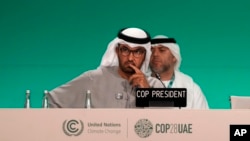Delegates from nearly 200 countries agreed Wednesday at a U.N. climate summit in Dubai to transition away from the use of fossil fuels.
The agreement came after two weeks of negotiations and takes aim at the main drivers of planet-warming greenhouse gas emissions.
More than 100 nations had pushed for even stronger language, seeking an explicit “phase-out” of fossil fuels.
The final agreement calls instead for “transitioning away from fossil fuels in energy systems, in a just, orderly and equitable manner, accelerating action in this critical decade.”
In addition to phasing out fossil fuel use, the agreement also calls for tripling renewable energy capacity by 2050 and accelerating technology such as carbon capture and storage.
"To those who opposed a clear reference to a phase out of fossil fuels in the #COP28 text, I want to say that a fossil fuel phase out is inevitable whether they like it or not,” U.N. Secretary-General Antonio Guterres said on X. “Let’s hope it doesn’t come too late.”
Fossil fuels currently supply about 80% of the world’s energy, including two-thirds of electrical generation, according to the U.N. Environment Program.
Implementation of the agreement will be in the hands of individual countries and how they adapt their own policies and investments.
Some information for this report came from The Associated Press, Agence France-Presse and Reuters





